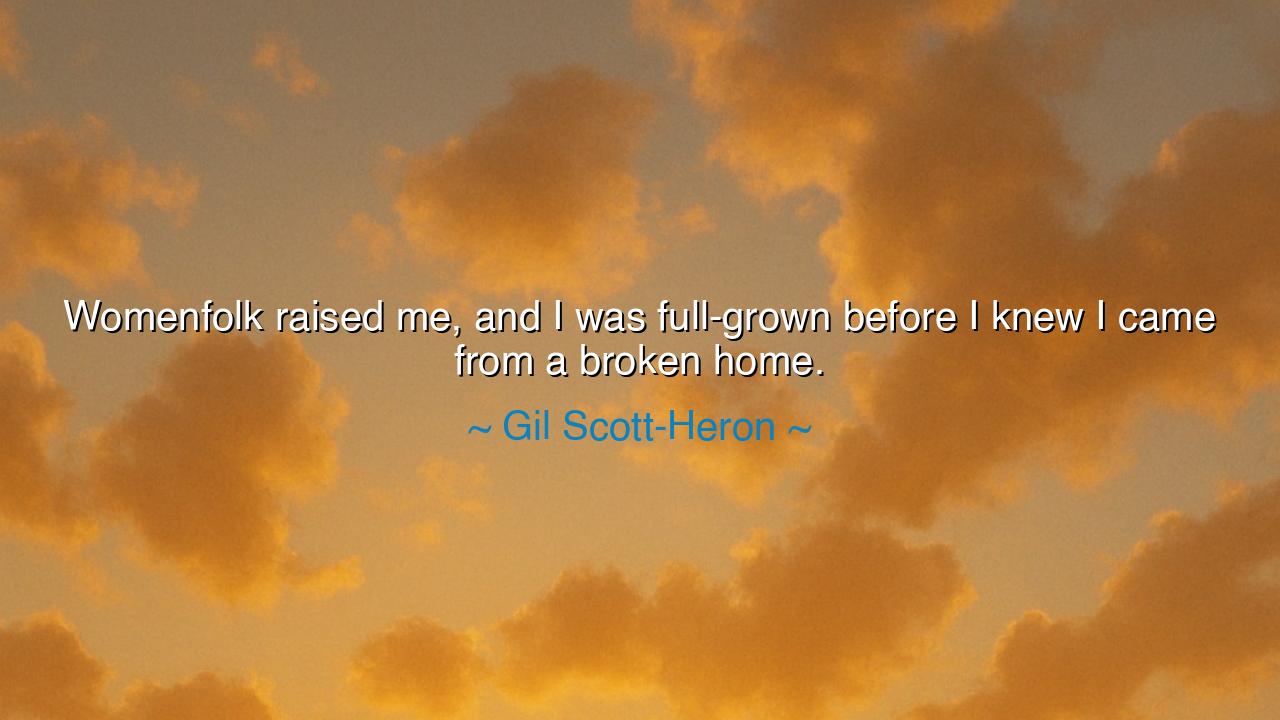
Womenfolk raised me, and I was full-grown before I knew I came






In the soulful words of Gil Scott-Heron, the poet and prophet of rhythm and truth, we hear a confession wrapped in wisdom: “Womenfolk raised me, and I was full-grown before I knew I came from a broken home.” Beneath the simplicity of his tone lies a universe of strength, sorrow, and revelation. This is not merely a man’s reflection on his upbringing — it is a testament to the power of women, the resilience of love, and the blindness of innocence that shields a child from pain until he is wise enough to name it. It is a hymn for all who were forged in the fire of hardship, yet emerged whole through the quiet grace of those who loved them.
To say that womenfolk raised me is to acknowledge a lineage of endurance. The mothers, grandmothers, aunts, and sisters who step forward when the family falters are the invisible architects of survival. They carry not only children but the weight of the world — mending what was shattered, feeding hope where none should grow. In many homes, they are both shield and sword, teaching by example the lessons that no father was present to give. And yet, in Scott-Heron’s revelation, there is no bitterness. There is gratitude — the dawning understanding that though the home was “broken,” the spirit was never crushed. The love of women was enough to build a world where loss became strength.
In the ancient days, the poets would have called such women keepers of the hearth, the sacred flame that warms even the coldest nights of human history. When the walls of kingdoms fell and men marched away to war, it was the women who kept the fires lit, who sang songs of courage to children in the dark. Like the Spartan mothers, who told their sons to return with their shields or upon them, they bore suffering with silent pride. In every age, where the fathers falter, it is the women who preserve the future. Scott-Heron’s words honor that unbroken chain — the matriarchs who raise warriors not with iron, but with tenderness.
Yet, the second part of his confession cuts deeper: “I was full-grown before I knew I came from a broken home.” This is the awakening that comes with manhood — when one sees clearly the cracks that were once invisible in childhood. The child lives in the miracle of what is present; the man recognizes what was missing. And in that recognition, there is both sorrow and reverence. For he realizes that he was not simply raised — he was rescued. His ignorance was not neglect, but a gift: a shield crafted by the women who refused to let him see the world’s cruelty too soon.
There is a story told of Frederick Douglass, who was born into slavery and separated from his mother as a child. She would walk miles at night, after her day’s labor, just to hold him for a few stolen moments before dawn. He barely knew her face, yet her love shaped the foundation of his soul. When he later escaped bondage, it was her memory — her sacrifice — that guided him toward freedom. Like Scott-Heron, Douglass was raised by the love of women who gave everything, even in absence. His was also a “broken home”, but through that brokenness came the birth of unbreakable men.
The origin of Scott-Heron’s quote lies not in a single family, but in the collective experience of a generation — and indeed, of countless generations. It speaks to the reality of the African-American experience, to communities where systemic wounds tore families apart, yet the spirit of motherhood refused to yield. But beyond race, it speaks universally to all children of struggle, to all who were made whole by those who refused to let love die. It is a reminder that brokenness is not the end of a story, but the beginning of resilience.
So let this be the lesson: wholeness is not found in perfection, but in perseverance. The home may be broken, but if love endures, the soul remains intact. The women who raise us — whether mothers by blood or by spirit — are the unseen pillars that hold up the world. To honor them is to honor life itself.
Action to take: remember the hands that shaped you. Call them, thank them, bless them. If you were raised in the shadow of absence, let gratitude be your rebellion against despair. Carry forward their strength, their gentleness, their faith. And when you build a home of your own, do not measure its wholeness by who is missing, but by the love that remains. For as Gil Scott-Heron teaches us, a broken home can still raise an unbroken soul — and from that soil, the next generation may rise stronger than the one before.






AAdministratorAdministrator
Welcome, honored guests. Please leave a comment, we will respond soon